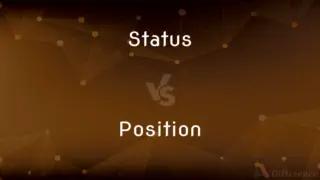Synonyms vs. Antonyms — What's the Difference?
By Maham Liaqat & Fiza Rafique — Updated on May 13, 2024
Synonyms are words with similar meanings, enhancing language richness and variety, whereas antonyms are words with opposite meanings, crucial for expressing contrasting ideas.

Difference Between Synonyms and Antonyms
Table of Contents
ADVERTISEMENT
Key Differences
Synonyms are words or phrases that mean nearly the same thing, allowing for varied expression in language. For example, "happy" and "joyful" convey similar sentiments. Whereas, antonyms are words that have contrasting meanings, such as "happy" and "sad," which help to clearly differentiate between opposite concepts.
Using synonyms can enrich text, making it more engaging and preventing repetitive word use. On the other hand, antonyms are essential for clear communication, especially when defining limits or differences, enhancing understanding through contrast.
Synonyms often come in gradations, reflecting subtle differences in meaning or context; "angry," "irate," and "furious" suggest increasing intensity. Conversely, antonyms present clear dichotomies, starkly contrasting concepts like "hot" and "cold" which do not overlap.
In educational settings, learning synonyms helps students expand their vocabulary and improve their writing skills. Whereas, understanding antonyms aids in developing cognitive skills by enabling students to process and articulate opposing ideas effectively.
Lexicographers, who compile dictionaries, often list synonyms to provide context and breadth to word definitions, helping users understand nuances. On the other hand, they use antonyms to sharpen the distinctions between words, aiding in clearer and more precise communication.
ADVERTISEMENT
Comparison Chart
Definition
Words with similar meanings
Words with opposite meanings
Purpose in Language
Enhance richness and variety
Express contrast and opposition
Usage
Prevents repetition, enriches text
Defines limits, enhances clarity
Examples
Happy, joyful; fast, quick
Hot, cold; tall, short
Educational Impact
Expands vocabulary
Develops cognitive understanding
Compare with Definitions
Synonyms
Synonyms are words with similar meanings.
Big and large are synonyms.
Antonyms
They clarify through contrast.
The weather changed from hot to cold.
Synonyms
Synonyms help avoid repetitive language.
The quick fox jumps over the speedy dog.
Antonyms
Antonyms are words with opposite meanings.
Hot and cold are antonyms.
Synonyms
They can be used interchangeably in many contexts.
She felt happy or joyful at the news.
Antonyms
Antonyms enhance understanding by setting boundaries.
Full and empty show clear differences.
Synonyms
They add stylistic variation to writing.
He was tired but felt more weary than exhausted.
Antonyms
They are crucial for precise descriptions.
The choices were correct or incorrect.
Synonyms
Synonyms reflect different intensity or formality.
Ask is more casual, while inquire is more formal.
Antonyms
Antonyms can be gradable or non-gradable.
Young and old vary by degree, whereas dead and alive do not.
Synonyms
A word having the same or nearly the same meaning as another word or other words in a language.
Antonyms
A word having a meaning opposite to that of another word
The word "wet" is an antonym of the word "dry.".
Synonyms
A word or expression that serves as a figurative or symbolic substitute for another
"Romeo has become a synonym for any youthful lover" (Harry Levin).
Antonyms
Plural of antonym
Synonyms
(Biology) One of two or more scientific names that have been applied to the same species or other taxonomic group.
Synonyms
Inflection of synonym
Common Curiosities
Can a word have both synonyms and antonyms?
Yes, many words can have both synonyms and antonyms, depending on the context.
What are antonyms?
Antonyms are words that have opposite meanings.
What are synonyms?
Synonyms are words that have similar or nearly the same meanings.
Why are synonyms important in writing?
They enhance the richness of language, prevent repetition, and can convey slight nuances in meaning.
What is an example of a synonym pair?
"Beautiful" and "attractive" are examples of synonyms.
How do antonyms aid in communication?
They help to express clear oppositions and contrasts, which is vital for detailed and precise communication.
Are synonyms and antonyms used in everyday speech?
Yes, both are used frequently in everyday language to articulate thoughts more clearly or vividly.
What role do antonyms play in learning a new language?
Learning antonyms is essential as they help in grasively understand the scope and limits of words.
What is an example of an antonym pair?
"Advance" and "retreat" are examples of antonyms.
How do synonyms affect reading comprehension?
They can improve comprehension by providing context and hints about the meaning of unfamiliar words.
Share Your Discovery

Previous Comparison
Itemised vs. Itemized
Next Comparison
Status vs. PositionAuthor Spotlight
Written by
Maham LiaqatCo-written by
Fiza RafiqueFiza Rafique is a skilled content writer at AskDifference.com, where she meticulously refines and enhances written pieces. Drawing from her vast editorial expertise, Fiza ensures clarity, accuracy, and precision in every article. Passionate about language, she continually seeks to elevate the quality of content for readers worldwide.













































